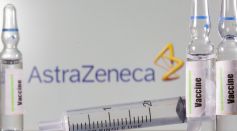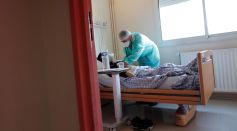Tags: CoViD-19
Scientists Discover How Coronavirus Uses "Genome Origami" to Infect and Replicate Human Cells

NHS Gears Up for COVID-19 Pre-Christmas Vaccine Roll-Out, Just in Case It Becomes Available

Researchers Fabricate A Mask That "Deactivates" Pathogens
Should We End the Lockdowns to Get Herd Immunity? Great Barrington Declaration Says Yes!
Covid-19 and Thousands of Other Virus Mimic Host Protein Stuctures and Functions

Having More Than 5 Coronavirus Symptoms May Place You at Risk of a Long-COVID Case

Asymptomatic COVID-19 Patients May Lose Antibodies Sooner Than Those With Symptoms
You Might Be Ignoring the Easiest Way To Catch COVID-19, Fauci Says

How to Fix iPhone 12 COVID-19 Contact-Tracing App: Don't Delete Previous Data Unless Needed
COVID-19 Vaccine Trials May Not Save Lives, Prevent Illness, or Stop Transmission

Long COVID Syndrome: Study Points Risk Factors, Treatment and How to Manage It

Sewage May Reveal COVID-19 Outbreaks, UK Project Finds

Certain COVID-19 Vaccines May Leave People More Vulnerable to HIV, Experts Warn
Astrazeneca's COVID-19 Vaccine Trials to Continue Even After a Volunteer Dies

Science Unveils the Biggest Halloween Risks Due to COVID-19

Expert Claims Brushing Teeth More Often Could Help Ward Off COVID-19

Parosmia: A Foul-Smelling Effect of COVID-19
US Enters Third Wave of COVID-19 As States See a Surge of New Cases

Remdesivir Does Not Cut Hospital Days and Mortality on COVID-19 Patients, WHO Study Reveals
Swine Coronavirus SADS-COV May Be Deadly for Humans as Well
Most Popular

10 Weird Things the Human Body Does—and the Science Behind These Biological Mysteries

Why Mega Typhoons Keep Getting Stronger: The Science Behind Typhoon Formation and Extreme Weather

Top Space Technology Trends and Aerospace Innovations Revolutionizing the World Today

How Plate Tectonics Trigger Earth's Most Dangerous Disasters Through Powerful Seismic Hazards




